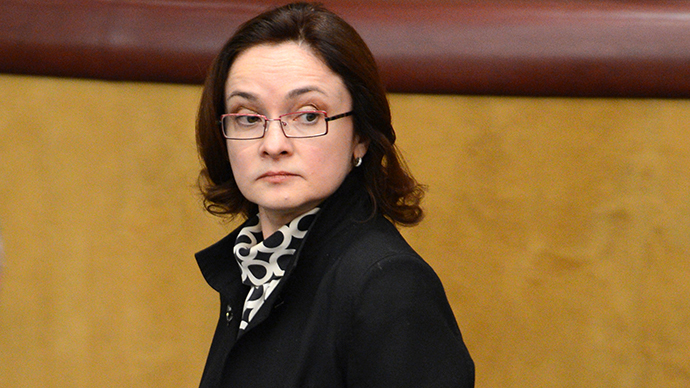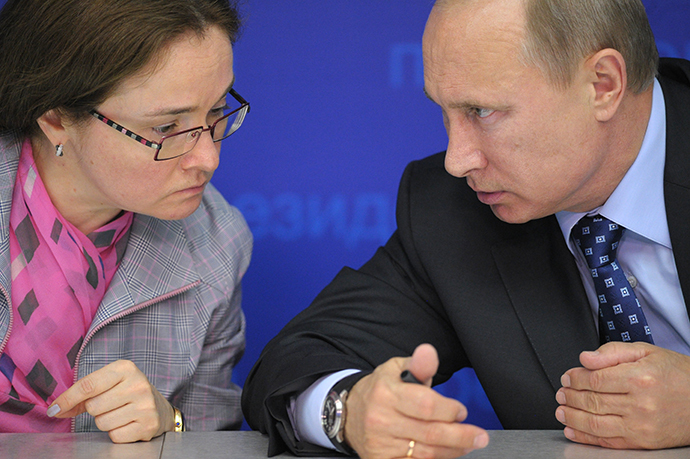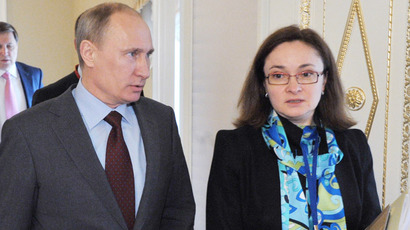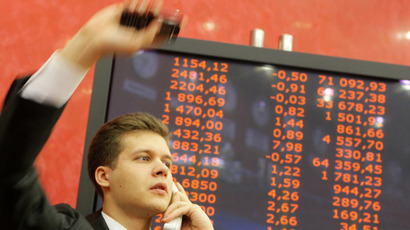Nabiullina takes over Russia’s Central Bank’s top post

Elvira Nabiullina has officially taken over the chairmanship in Russian Central Bank from the former head of the monetary regulator Sergey Ignatiev on Monday.
Ignatiev will remain working at the institution as Nabiullina’s
adviser.
The Russian economy is expanding at the slowest pace since the
2009 contraction. “I would say the policy should be
continuity, but taking into account new challenges,”
Nabiullina said Monday. “Slowing economic growth is a reality
that the central bank will need to consider,” she added.
Nabiullina has said that it will be difficult for Russia's $2 trillion economy to reach the 5 percent annual growth rate the Kremlin has set out to achieve.
"With the current structure of our institutions, 5 percent is
just impossible," said Nabiullina, Reuters reported. She
added that such an aggressive growth policy using Central
Bank liquidity could lead to stagflation in Russia.
Elvira Nabiullina, 49, is a former economy minister and will have
to deal with the conflict between the government and the central
bank over lowering interest rates, which in the government’s view
is a quick way to boost growth.
Speaking to the Interfax news agency Nabiullina said devaluing the rouble and lowering interest rates are “dangerous” options for the economy.
The Russian State Duma approved Nabiullina’s nomination for the top post in the Central Bank in April, after President Vladimir Putin picked his chief economic aide and member of his inner circle to lead the monetary authority.
Before Putin nominated Nabiullina, there had been several other
possible candidates for the chairman’s job, including Central
Bank First Deputy Chairman Aleksey Simanovsky, the head of VTB
Andrey Kostin and another Central Banker Mikhail Sukhov. Among
them also was Aleksey Ulyukayev, Russia's Central Bank deputy
head, who was today appointed as the new Economic Development
Minister.

Elvira Nabiullina was Russia's Minister of Economic Development and Trade in 2007-2012. In 2012 was made the President’s chief economic aide.
Meanwhile Economy Minister Andrey Belousov was appointed to replace Nabiullina at the presidential administration according to a Kremlin statement.
New Central Bank policy under Nabiullina
“For me it is very important to focus on institutional
solutions, changing the institutions which would lead to
long-term changes. Such work not always provides quick results.
But it is improving the quality of the institutions. High quality
regulation can seriously change the situation in the economy like
nothing else,” Nabiullina told Kommersant daily.
The main questions are the value of the Russian currency and
interest rates. They have been in the spotlight during the recent
SPIEF, St.Petersbug International Economic Forum.
The rouble has significantly weakened over the past week, after
Finance Minister Anton Siluanov said the institution plans to
begin a slight devaluation of the Russian currency to boost
demand. “A small weakening in the rouble’s exchange rate can
play a positive role in the federal budget revenue and the
economy as a whole,” Siluanov is quoted by Bloomberg as
saying.
The Central Bank has been supporting freely fluctuating exchange rates. Nabiullina agrees, saying weakening the rouble artificially in order to boost exports can be “dangerous” in the current unstable global economic situation.
In an interview with Kommersant she said that the countries artificially weakening exchange rates do it in order to support exports in certain spheres of the economy. “Looking at our presence in the markets and considering how much devaluing of the rouble can boost exports in these spheres we will see, that growth will still be insignificant,” Nabiullina said. Meanwhile she added that other sectors of the economy would suffer from the devaluation. “Import costs of investment equipment will increase, as will increase consumer price, largely determined by the prices of imports,” she said. “Before even suggesting such ideas, it is necessary to consider the consequences.”
“The central banks of a few countries really have gone beyond their traditional mandates in recent years and were forced to compensate for weak progress in structural reforms with monetary policy measures,” Nabiullina is quoted by Bloomberg as saying. “I can’t say those policies have been able to secure a stable trajectory of growth.”
Another problem Russia has yet to solve is the urge to boost
available credit to small and medium-sized businesses.
Elvira Nabiullina is facing a tricky task to deal with the
conflict between the government and the central bank over
interest rates.
According to First Deputy PM Igor Shuvalov the government has already developed proposals, which will help to bring down the value of corporate loans.
Nabiullina has rejected the proposal put forward by former
Economy Minister Andrey Belousov and now the presidential aide on
setting indicative lending rates that may be used to determine
whether the banks are charging too much, Bloomberg says.
“It’s a mechanism that would be difficult to implement, and it
may have the opposite effect, reducing the volume of
lending,” Nabiullina said, calling the idea a “Soviet
approach.”
“The banks will not lower their rate to the indicative, they will simply stop lending,” Nabiullina is quoted by Kommersant as saying. “When we begin restraining prices of any product, bread, gas or loans, it causes a deficit of this product,” she added.
Nabiullina also said she sees improving the investment climate in
Russia among the top priorities.














